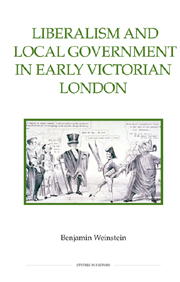Book contents
- Frontmatter
- Contents
- Acknowledgements
- Abbreviations
- Introduction
- 1 Liberal attachments to the unreformed metropolis
- 2 The ‘radicalisation’ of metropolitan political culture, 1832–1841
- 3 The polarisation of metropolitan political culture, 1842–1855
- 4 Redefining the state, I: Rates and taxes, 1834–1853
- 5 Redefining the state, II: The London government problem
- 6 Marylebone in 1854: from conflict to compromise
- Conclusion
- Bibliography
- Index
1 - Liberal attachments to the unreformed metropolis
Published online by Cambridge University Press: 12 September 2012
- Frontmatter
- Contents
- Acknowledgements
- Abbreviations
- Introduction
- 1 Liberal attachments to the unreformed metropolis
- 2 The ‘radicalisation’ of metropolitan political culture, 1832–1841
- 3 The polarisation of metropolitan political culture, 1842–1855
- 4 Redefining the state, I: Rates and taxes, 1834–1853
- 5 Redefining the state, II: The London government problem
- 6 Marylebone in 1854: from conflict to compromise
- Conclusion
- Bibliography
- Index
Summary
Prior to the 1832 parliamentary reform, the idea of ‘London’ was central to the ways in which both Whigs and constitutional radicals constructed their group identities. At the same time the idea of ‘London’ influenced the manner in which these liberal subgroups interacted with the metropolitan constituencies, and with one another. Interaction between Whigs and constitutional radicals was both vigorous and formative in the immediate pre-reform period. Francis Burdett's vacillation between the dinner table at Holland House, the debating table at Bentham's Queen Square salon, and the Speaker's table at the Crown and Anchor tavern is just one example of this interaction. Of course, any explanation of London's early Victorian political culture must also account for the ways in which these liberal subcultures interacted with London itself. This chapter therefore considers each group's unique pre-reform relationship to the metropolis in order to explain how such attachments ultimately influenced each group's approach to the ‘London government problem’ and to London's reformed political culture in general. Popular or constitutional radicals were, however, by no means the only ones with organic connections to London. Although Whigs and constitutional radicals interacted with and conceived of ‘London’ in discrete ways, each group also shared complementary assumptions about the proper construction of metropolitan political culture. In particular, both groups cherished London as a site of political heritage and as a stage for patrician political leadership.
- Type
- Chapter
- Information
- Publisher: Boydell & BrewerPrint publication year: 2011

